Fred Basset
Fred Basset card game published by Pepys in 1977 based on the cartoon strip by Alex Graham.
Fred Basset card game was published by Pepys Games in 1977 based on the cartoon strip by Scottish cartoonist Alexander S. Graham (1917–1991) which was first published in the Daily Mail on 8 July 1963. The object of the card game is to make pairs of matching cards but there is only one ‘Fred’ card... See the Rules► See the Box►
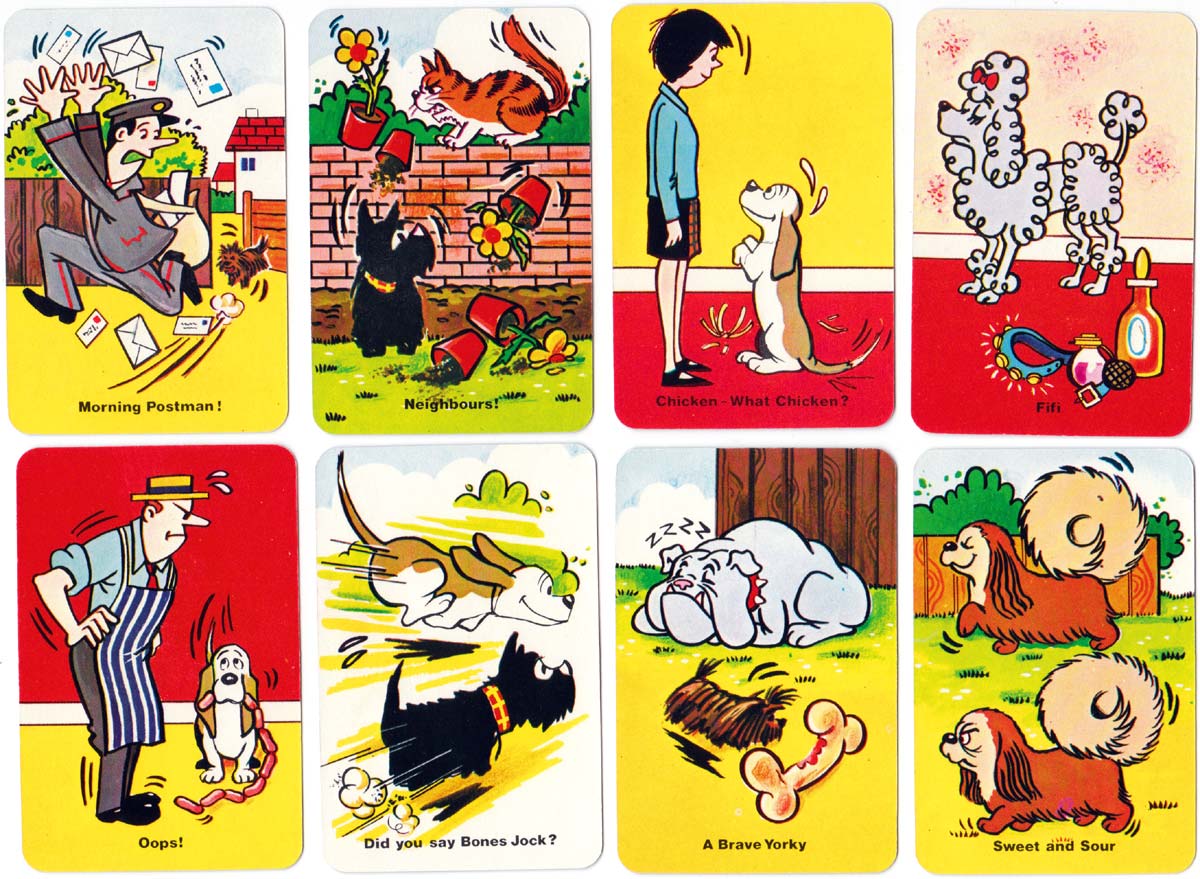
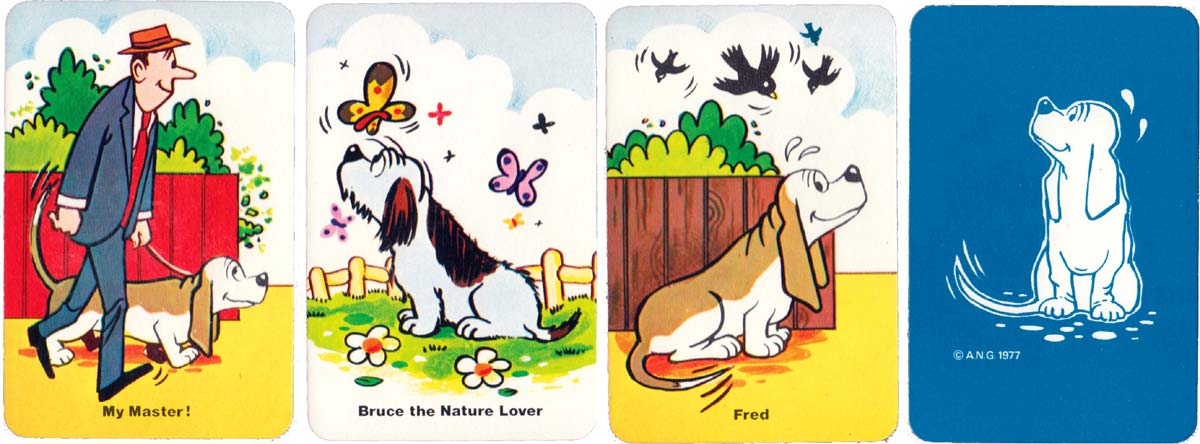
Above: Fred Basset published by Pepys Games, 1977.
NOTES
In 1960 Nancy Collins, the wife of Kenneth Collins the MD of Castell Brothers, became MD of E J Larby when the owner Earnest Larby retired. He sold E J Larby to Kenneth and Nancy Collins and the offices were combined with those of Castell Brothers Ltd. The companies were merged to form Castell Larby. In 1973 anticipating his retirement, the company was sold to Graphics Publicity Ltd with Kenneth staying on for two more years. The company was sold again in 1977 not doing very well. The buyer was T J & J Smith Ltd who produced Dataday diaries and were a competitor with Pepys in that market. After huge losses 2 years running the company was closed and remained moribund until it was finally disassociated in 1983. At that point H P Gibson acquired the existing range of games in 1984. They still produce a few of them today.
By Rex Pitts (1940-2021)
United Kingdom • Member since January 30, 2009
Rex's main interest was in card games, because, he said, they were cheap and easy to get hold of in his early days of collecting. He is well known for his extensive knowledge of Pepys games and his book is on the bookshelves of many.
His other interest was non-standard playing cards. He also had collections of sheet music, music CDs, models of London buses, London Transport timetables and maps and other objects that intrigued him.
Rex had a chequered career at school. He was expelled twice, on one occasion for smoking! Despite this he trained as a radio engineer and worked for the BBC in the World Service.
Later he moved into sales and worked for a firm that made all kinds of packaging, a job he enjoyed until his retirement. He became an expert on boxes and would always investigate those that held his cards. He could always recognize a box made for Pepys, which were the same as those of Alf Cooke’s Universal Playing Card Company, who printed the card games. This interest changed into an ability to make and mend boxes, which he did with great dexterity. He loved this kind of handicraft work.
His dexterity of hand and eye soon led to his making card games of his own design. He spent hours and hours carefully cutting them out and colouring them by hand.

Leave a Reply
Your Name
Just nowRelated Articles
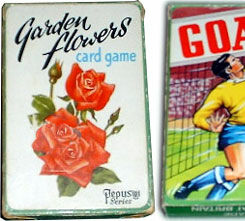
Pepys Games
The Story of Pepys Games by Rex Pitts
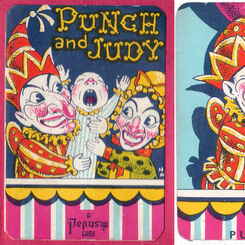
Punch & Judy
Punch and Judy card game published by Pepys, 1956.
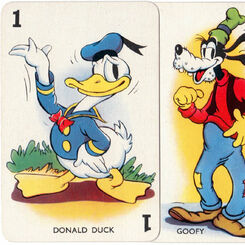
Shuffled Symphonies
Shuffled Symphonies published by Pepys Games in association with Walt Disney, 1939.
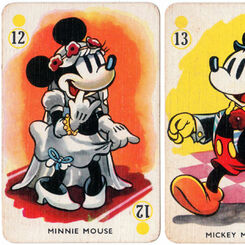
Mickey’s Fun Fair
Mickey’s Fun Fair published by Pepys Games in collaboration with Walt Disney, 1939.
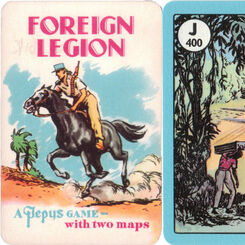
Foreign Legion
Foreign Legion published by Pepys, 1960.
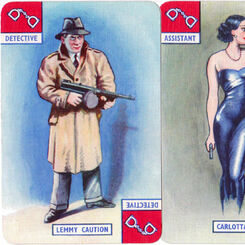
Crime Club
Crime Club card game by Peter Cheyney, issued by Pepys Games, 1939.
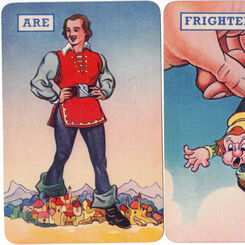
Gulliver’s Travels
Gulliver’s Travels by Pepys Games, based on the cartoon film, 1940.

Secret Agent
Secret Agent by Pepys Games, the card game with the magic monocle, 1957.
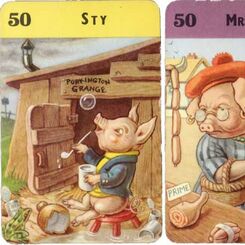
Farmyard Cries
Farmyard Cries card game, designed by Racey Helps and published by Pepys Games, 1952.

Find Out
Find Out mystery card game based on the Find Out books by Enid Blyton, published by Pepys, 1958.
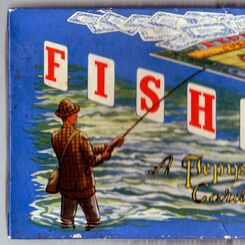
Fishing
Fishing published by Pepys Games, 1951.
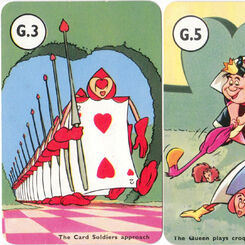
Alice in Wonderland Card Game
Alice card game published by Pepys in 1952, based on the Walt Disney film “Alice in Wonderland”.
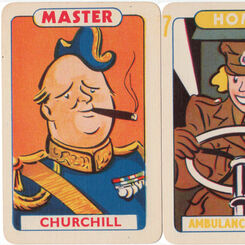
Victory
“Victory” by Pepys Games, a splendid game with caricatures of British and German leaders, published ...

Dumbo
Walt Disney’s Dumbo card game published by Pepys, 1939.
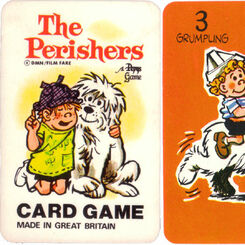
The Perishers
The Perishers, based on the TV cartoon series, published by Pepys in 1974.
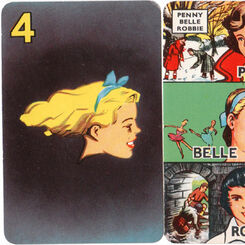
Girl
Girl card game published by Pepys Games, 1955.

Jungle Book
Jungle Book by Pepys games, inspired by Walt Disney, 1967
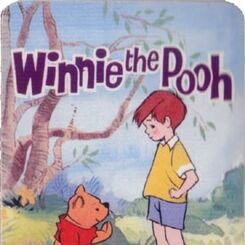
Winnie the Pooh
Winnie the Pooh card game published by Pepys Games 1965.
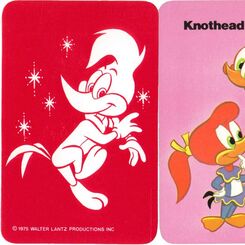
Woody Woodpecker
Woody Woodpecker card game by Pepys, 1975.
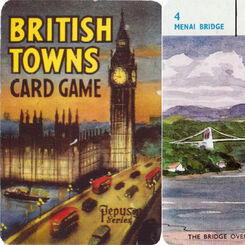
British Towns
British Towns Card Game by Pepys Games (Castell Brothers Limited).
Most Popular
Our top articles from the past 60 days


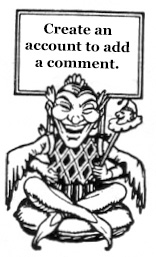 Your comment here. Your comment here. Your comment here. Your comment here. Your comment here. Your comment here. Your comment here. Your comment here. Your comment here. Your comment here. Your comment here. Your comment here. Your comment here. Your comment here. Your comment here. Your comment here. Your comment here. Your comment here. Your comment here. Your comment here. Your comment here. Your comment here. Your comment here. Your comment here. Your comment here. Your comment here. Your comment here. Your comment here. Your comment here. Your comment here. Your comment here. Your comment here.
Your comment here. Your comment here. Your comment here. Your comment here. Your comment here. Your comment here. Your comment here. Your comment here. Your comment here. Your comment here. Your comment here. Your comment here. Your comment here. Your comment here. Your comment here. Your comment here. Your comment here. Your comment here. Your comment here. Your comment here. Your comment here. Your comment here. Your comment here. Your comment here. Your comment here. Your comment here. Your comment here. Your comment here. Your comment here. Your comment here. Your comment here. Your comment here.




















